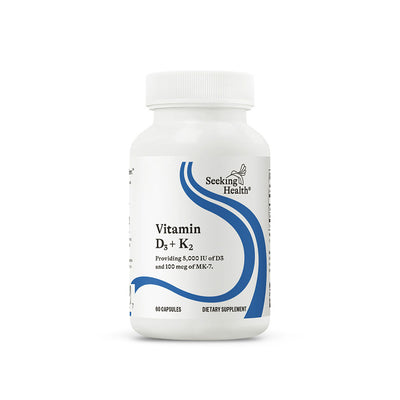You may find it difficult to get enough folate if have the MTHFR gene mutation. This begs the question: What can you do to get the folate you need to stay healthy? Of course, you’ll want to look at your diet. While adding or subtracting one thing would be easy, it’s actually going to be a combination of healthy dietary habits that will make the biggest difference.

You may need to swap one food type with another to help increase your body’s ability to get the folate it needs. But first, it helps to understand what’s going on (or not going on) in your body when you have an MTHFR gene mutation, so it makes more sense. This will also help you confidently talk with your healthcare practitioner to start making and sticking to the right changes.
As you keep reading, you’ll learn more about good and bad foods with the MTHFR gene mutation. You’ll also find other ways to support MTHFR by taking the supplements Seeking Health has created specifically for you.
What Is an MTHFR Gene Mutation?
An MTHFR gene mutation is when you inherit a variant on the gene responsible for your body’s ability to process folate from each parent. It means there are changes in how the MTHFR gene's coded and how it works. The two most common gene variations are MTHFR C677T and MTHFR A1298C. MTHFR C677T is common to Whites and Hispanics in the U.S. MTHFR A1298C is more common in North American, European, and Australian populations.(1)

You inherit one MTHFR gene from each parent, and each of them may have a variant. If you inherit only one variant, you are less likely to have problems. But suppose you inherit at least two and have an MTHFR polymorphism? In that case, you’re more likely to develop health issues because your body can’t convert folate to its usable form. Remember, you need folate to break down homocysteine so it can be used for chemical processes throughout your body, like methylation.
High homocysteine levels can potentially lead to several health conditions:(2)
- Heart and circulatory system issues
- Blood clots
- Pregnancy complications
- Age-related hearing loss
- Slow growth and weight gain
- Nervous system issues
- Some forms of anemia, including megaloblastic anemia
- Homocystinuria
Now that you understand more about MTHFR, you can start looking at ways to manage and improve your health.
What Foods Should You Avoid With Folic Acid If You Have the MTHFR Variation?
If you have the MTHFR variation, you should avoid several foods and food groups. They include any fortified with synthetic folic acid. Synthetic folic acid is not bioavailable and can potentially build up in your system. This may cause homocysteine levels to increase, and you may not feel too well.
Foods that are often fortified with folic acid that you should avoid include:(3)
- Processed foods
- Energy drinks
- Energy bars
- Bread
- Noodles
- Enriched flour
- Breakfast cereals
- Pasta
- Rice
- Cornmeal
You should also avoid taking supplements with folic acid. Taking too much may mask a vitamin B12 deficiency.(4) You need B12 to make red blood cells and DNA. If you have a B12 deficiency, you may become anemic because you won’t have enough healthy red blood cells.
A specific type of anemia caused by either a B12 or folate deficiency is called megaloblastic anemia.(5) It causes your body to create very large, underdeveloped red blood cells that tend to die quickly. You may not know anything is wrong until you start feeling unwell (tiredness, nausea, weight loss, yellowish skin). Your healthcare practitioner can give you a blood test to determine if you have a B12 deficiency.
Are Eggs Bad for MTHFR?
Eggs are not bad for MTHFR. In fact, they can be a great way to get the natural folate your body needs, specifically 5-methyltetrahydrofolate.(6) Organically farmed eggs have the most folate, up to 22% of the recommended daily allowance. Eggs with the lightest yolk may offer the most folate—this is surprising since many of us think that the richer the yolk, the healthier the egg. Unless your healthcare practitioner says otherwise, you can also safely eat up to 14 eggs per week.

Why Is Dairy Bad for MTHFR?
Like the other foods you read about earlier, dairy is bad for MTHFR because it’s also often fortified with the synthetic folic acid your body can’t process. Also, the lactose and saturated fats in some dairy may cause inflammation.
You may be more susceptible to inflammation if you have MTHFR because you can't process folate. This can lead to high homocysteine levels. High homocysteine levels are connected to inflammatory heart diseases such as homocysteine-induced endothelial dysfunction.(7)
If you have a MTHFR gene mutation, you may also have gluten-related problems.(8) Not coincidentally, lactose intolerance is linked to gluten intolerance.(9) This may be why some with the MTHFR gene mutation can't tolerate milk products, maybe you included.
You can talk with your healthcare practitioner about your risks and if you should cut dairy from your diet.
What Foods Should You Eat With MTHFR?
You can eat many delicious foods with MTHFR to get the folate and other nutrients your body needs. They include whole, unprocessed foods naturally rich in natural folate and a lot of leafy greens. These items are easy to spot in the produce aisle because they are generally rich in color and catch your eye.
Some of the foods with the most folate include:(10)
- Spinach
- Black-eyed peas
- Asparagus
- Brussels sprouts
- Lettuce
- Avocado
- Spinach
- Broccoli
- Mustard greens
While most meats are low in folate, animal liver is the exception to the norm. Liver may not sound like the most appealing thing to eat, but it’s dense in nutrition, including folate. Liver is considered the folate storage organ of the body, with levels similar to broccoli, spinach, and legumes.(11) Even when cooked—because cooking food can make it lose nutrients—liver actually has more folate than most folate-abundant plant foods.

What Makes MTHFR Worse?
Taking a folic acid supplement or eating anything "enriched" or "fortified" with synthetic folic acid can worsen MTHFR. This is because your body can't use folic acid since it's not bioavailable, and it's challenging for your gut to process and use it.(12)
Many countries mandate fortification of folic acid in certain foods. For example, the U.S. has required that cereals be fortified with folic acid since 1998. This means cereals may have as much as 400 micrograms of folic acid per serving.(13)
There is some concern that the folic acid you may take from fortified foods and supplements can build up in your blood cumulatively. This may cause you to experience side effects, including:
- Nausea
- Irritability
- Problems sleeping
- Confusion
- Loss of appetite
If you find yourself chronically feeling down and your mood low, this can also make MTHFR worse. You may have a neurotransmitter imbalance if you have the MTHFR gene mutation. Neurotransmitters help regulate your mood. Up to one-third of those who experience severe mood disturbances may have a folate deficiency.(14)
If you suffer from low mood, it may be because your blood isn’t able to use homocysteine to create S-adenosylmethionine (SAMe). Your body needs SAMe to generate neurotransmitters so you are more resilient toward mood disturbances. If you feel nervous, MTHFR may also be to blame because a folate deficiency can also increase nervousness.(15)
It’s a vicious circle. The more stressed and down you feel, the worse your MFTHR gene mutation symptoms may become. If you can’t control your mood, please talk to your healthcare practitioner about how you’re feeling immediately so you can start taking steps toward better emotional well-being.

Seeking Health’s MTHFR Support Supplements†
If you have an MTHFR polymorphism, Seeking Health has several Dirty Genes™ - MTHFR support supplements available that can help you ensure you get enough bioavailable folate so your methylation processes don’t slow down. These MTHFR support supplements can help support good health and promote methylation.†
- B Complex Plus supports healthy energy production, hormone balance, and mood. It also helps with methylation and maintaining healthy homocysteine levels.†
- Homocysteine Nutrients provides powerful heart health support and supports healthy cognition and brain function.†
- L-Methylfolate offers powerful methylation, MTHFR, homocysteine, and healthy genetic expression support.†
- Methyl B12 with L-Methylfolate (Formerly Active B12 with L-5-MTHF) is available in a well-absorbed lozenge and offers B12 with active, methylated folate to support optimal mental clarity and brain health.†
The Bottom Line
You can do several things to take charge of your health in support of MTHFR. While you may need to stop eating processed foods, folic acid-fortified foods, and dairy, you can add delicious and nutritious items to your diet. Gaining control over your emotions and learning to manage stress can also help you stay healthy. Finally, you can feel assured knowing that Seeking Health has you in mind with its Dirty Genes™ - MTHFR Support Supplements.†
References
- https://pubmed.ncbi.nlm.nih.gov/26149435/
- https://my.clevelandclinic.org/health/articles/21527-homocysteine
- https://www.fda.gov/food/nutrition-facts-label/folate-and-folic-acid-nutrition-and-supplement-facts-labels
- https://pubmed.ncbi.nlm.nih.gov/34634124/
- https://pubmed.ncbi.nlm.nih.gov/32127439/
- https://pubmed.ncbi.nlm.nih.gov/33669220/
- https://pubmed.ncbi.nlm.nih.gov/26201664/
- https://pubmed.ncbi.nlm.nih.gov/16917400/
- https://pubmed.ncbi.nlm.nih.gov/35010876/
- https://ods.od.nih.gov/factsheets/Folate-HealthProfessional/
- https://pubmed.ncbi.nlm.nih.gov/33050265/
- https://pubmed.ncbi.nlm.nih.gov/24944062/
- https://pubmed.ncbi.nlm.nih.gov/22254102/
- https://pubmed.ncbi.nlm.nih.gov/10896698/
- https://pubmed.ncbi.nlm.nih.gov/27330489/
† These statements have not been evaluated by the Food and Drug Administration (FDA). This product is not intended to diagnose, treat, cure, or prevent any disease.









